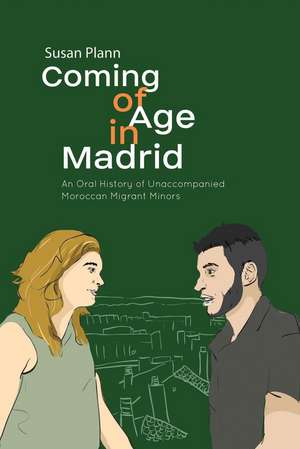Coming of Age in Madrid – An Oral History of Unaccompanied Moroccan Migrant Minors
Autor Susan Plannen Limba Engleză Paperback – 28 feb 2019
Coming of Age in Madrid; is a longitudinal study of twenty-seven Moroccan youth who migrated to Madrid as unaccompanied minors, passed their adolescence in the Spanish child-care system, and embarked on their lives as young adults. Using qualitative interviews to capture narrators accounts in their own words, this oral history examines their identity trans/formation, integration, and acculturation in Spain. Unaccompanied minor migration is on the rise throughout the world. As Spain and other nations grapple with increasing numbers of unaccompanied children on their borders, the importance of this study has immediate relevance for government policies and migration research.
| Toate formatele și edițiile | Preț | Express |
|---|---|---|
| Paperback (1) | 411.61 lei 6-8 săpt. | |
| Liverpool University Press – 28 feb 2019 | 411.61 lei 6-8 săpt. | |
| Hardback (1) | 832.19 lei 3-5 săpt. | |
| Liverpool University Press – 9 oct 2018 | 832.19 lei 3-5 săpt. |
Preț: 411.61 lei
Nou
Puncte Express: 617
Preț estimativ în valută:
78.76€ • 84.22$ • 65.67£
78.76€ • 84.22$ • 65.67£
Carte tipărită la comandă
Livrare economică 17 aprilie-01 mai
Preluare comenzi: 021 569.72.76
Specificații
ISBN-13: 9781845199814
ISBN-10: 1845199812
Pagini: 340
Ilustrații: illus
Dimensiuni: 152 x 229 x 19 mm
Greutate: 0.5 kg
Editura: Liverpool University Press
ISBN-10: 1845199812
Pagini: 340
Ilustrații: illus
Dimensiuni: 152 x 229 x 19 mm
Greutate: 0.5 kg
Editura: Liverpool University Press
Cuprins
Contents Acknowledgments Chapter 1: Introduction About this Research Moroccan Migration: A Historical Overview Moroccan Emigration: The View from Morocco Moroccan Immigration: The View from Spain Organization of This Book Part One: Moroccan Boyhood Chapter 2: Life before Migration Chapter 3: A Culture of Leaving Reasons for Leaving: Push Reasons for Leaving: Pull The Outliers Chapter 4: Preparing to "Burn" Parental Attitudes toward Minor Children's Migration Living Arrangements Breaching the Port Chapter 5: Perils of the Port A Primer on Unauthorized Emigration Survival Lessons Bereaved Families, Disappeared Children Chapter 6: Departure Try, Try Again The Crossing Toward a New Life Part Two: MENAs in Madrid Chapter 7: Arrival In a Strange Land Calling Home The Un/Kindness of Strangers The Police Station The Age Assessment Test Entering a Shelter, Leaving a Shelter Welcome to Madrid Choosing a Path Chapter 8: The Crucible: Life in the Child Protection System Residential Life Practicing Islam Learning Spanish, Going to School, Learning a Trade Skirmishes with the Police Repatriation Part Three: From MENAs to Men Chapter 9: Aging Out: Twenty is the New Thirty First Things First Continuing Education Encounters with the Law Vakansya: The First Trip Home Dreams Deferred, Dreams Come True Looking to the Future Chapter 10: Coming-of-Age Stories Idris Farid Rayan Samir Walid El-Habib Part Four: Integration, Discrimination, Acculturation, Identity Chapter 11: Negotiating Integration Negotiating Social Relations Negotiating Romance Negotiating Marriage Chapter 12: Navigating Prejudice Navigating the Spaniards Navigating the Moroccan Community in Spain Navigating Public Language Use Navigating the Metro Chapter 13: Negotiating Acculturation, Negotiating Identity Negotiating Acculturation Negotiating Gender Relations and Gender Roles Negotiating Language Negotiating Islam Negotiating Identity Part Five: Lessons Learned Chapter 14: Taking Stock Worth It? Advice to MENAs-in-Waiting Chapter 15: Conclusion Clandestine Emigration from Morocco Today Moroccan Child Migrants in Spain: Lessons Learned Final Thoughts Postscript Works Cited Index
Notă biografică
Susan Plann is UCLA Research Professor of Chicano Studies and Spanish and Portuguese, having retired in 2017. She is the author of three books and numerous articles. Her study of the Spanish Deaf community as a linguistic and cultural minority called for comparison of Spanish Sign Language with Spains co-official languages (Basque, Catalan, Galician, ), and this sparked an interest in the status of the Arabic language in Spain. The result was an important article on this topic, which involved qualitative interviewing which in turn led to the research presented in Coming of Age in Madrid.
